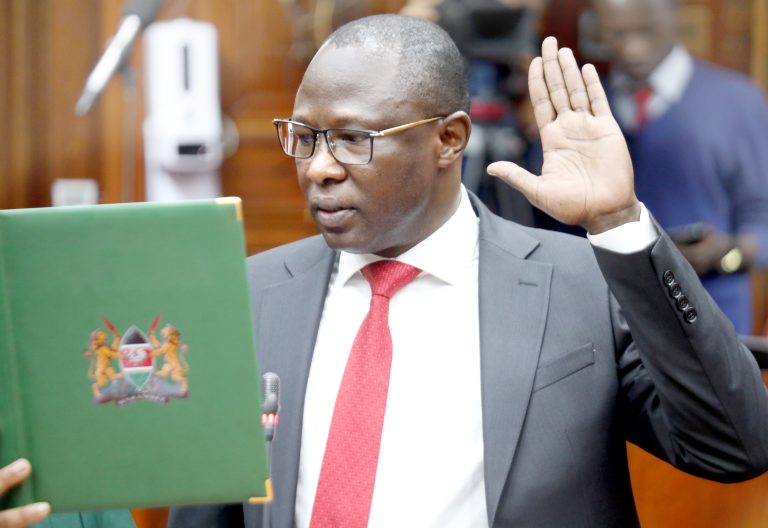IEBC nominees endorsed despite court injunction
By Mercy Mwai, June 4, 2025Lawmakers have approved President William Ruto’s nominees for the position of chairperson and members of the Independent Electoral and Boundaries Commission (IEBC).
The MPs serving on the Justice and Legal Affairs Committee, chaired by Tharaka MP George Murugara, approved the nominees and recommended that the House also endorse the committee’s decision.
The panel’s decision now sets the stage for the committee of the whole House to debate the report, where it will either approve or reject the nominees.
Appointments blocked
Those approved include Dr Erastus Edung Ethekon from Turkana County for the commission chairperson.
Members are Ann Njeru Nderitu (Nyandarua), Moses Alutalala Mukwhana (Kakamega), Mary Karen Sorobit (Uasin Gishu), Hassan Noor Hassan (Mandera), Francis Odhiambo Aduol (Kisumu) and Fahima Araphat Abdallah (Lamu).
“Pursuant to the provisions of Article 252(b) of the Constitution, the committee approves the appointment of Ethekon as the chairperson and Ms Nderitu, Mukwhana, Ms Sorobit, Hassan, Aduol, and Ms Abdallah,” Murugara said.
However, the court has blocked the appointments and swearing-in of the new IEBC team until a case filed against them is heard and determined.
The IEBC has been operating without commissioners since January 17, 2023, when the six-year non-renewable terms of the late chairperson Wafula Chebukati and commissioners Abdi Guliye and Boya Molu expired.
Their departure followed the resignation of several commissioners, including Vice Chairperson Juliana Cherera and commissioners Francis Wanderi and Justus Nyang’aya, in late 2022.
Commissioner Irene Masit, who chose to face a tribunal, was removed from office on February 27, 2023, following a tribunal recommendation and a formal decision by President Ruto.
Legal proceedings
The approval of the nominees comes after JLAC vetted the candidates over the weekend, following the High Court’s decision to lift an order that had previously barred the exercise from proceeding.
The President is required to formally appoint the approved nominees within seven days of receiving the National Assembly’s decision.
Justice Lawrence Mugambi, while allowing the vetting exercise to continue, issued a conservatory order restraining the swearing-in or assumption of office by the seven nominees, including the Chairperson nominee, pending the full hearing and determination of a constitutional petition filed by voters Kelvin Omondi and Boniface Mwangi.
In his decision, Justice Mugambi emphasised that although Parliament has the constitutional mandate to vet nominees, this does not override the judiciary’s constitutional role in reviewing whether the nomination process itself adhered to constitutional principles.
“Pending the hearing and determination of this petition, a conservatory order is hereby issued forbidding and/or preventing the taking of oath or assuming of office by the interested parties … or any other person or persons as the chairman or commissioners of the Independent Electoral and Boundaries Commission,” Mugambi said at the time.
Vetting process
During the vetting, the nominees used the opportunity to defend themselves and address allegations of potential bias in favour of President Ruto once they assumed office.
Ethekon, who said his net worth was Ksh227 million, was questioned about ongoing early campaigns.
He defended the practice, stating that such campaigns are fully entrenched in the Constitution.
He cited Article 38, which grants Kenyans the right to political participation, freedom of association, and expression.
Nderitu, who said his net worth was Ksh138 million, said that when she applied for the position, she was aware that one could not be appointed as commissioner while still holding a State office.
Legal consultant
Meanwhile, Mukwhana was asked to explain whether he would remain neutral despite his close ties with Prime Cabinet Secretary Musalia Mudavadi, having served as his legal consultant in the now-defunct Amani National Congress party.
Sorobit, Hassan, Aduol, and Abdallah were questioned on issues concerning constituency boundary redrawing, the use of technology in conducting polls, and adherence to timelines for conducting by-elections.
